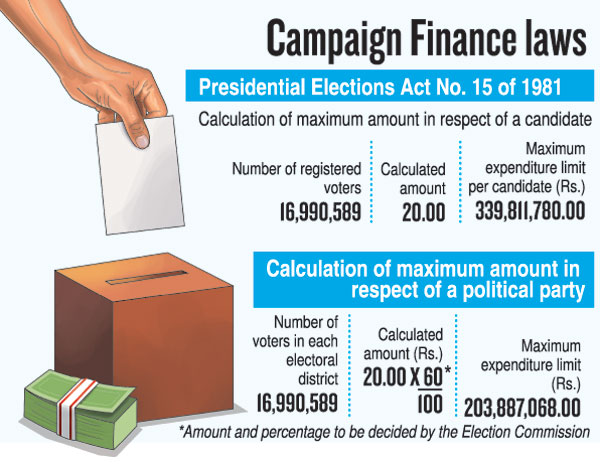New campaign finance laws come into force to ensure level playing field, prevent misuse of state resources Ban on donations, contributions from govt. depts, corporations, corporate bodies and foreign groups Commission to set the expenditure ceiling in consultation with political parties, independent groups.
All upcoming national elections will be subject to new campaign finance laws that will limit the amount of funding that candidates, political parties and independent groups can spend on their campaigns.
The new laws are yet to be tested, but with a presidential election due this year and a parliamentary election to follow early next year, the Election Commission (EC) has been meeting with various stakeholders to brief them on the legislation and obtain their views and suggestions on how best to move forward in implementing the law.
Provisions of the Regulation of Election Expenditure Act No. 3 of 2023 will apply to presidential, parliamentary, provincial council and local government elections. The main aims of the Act are to: ensure a level playing field for all candidates; create transparency regarding the donations and contributions given to candidates and their origins; prevent misuse of government property; prevent foreign states and organisations from interfering in the country’s governance; establish control over election expenditure and ensure transparency; safeguard people’s right to vote without being subjected to influence; and provide a legal foundation for campaign finance regulation, according to the EC.
Under the Act, within five days after the conclusion of the period of nominations, the EC shall, in consultation with recognised political parties and independent groups contesting such elections, issue a gazette specifying an amount in Sri Lankan rupees that will be used to calculate the authorised final amount. In the case of a presidential election, every candidate who has not been nominated by a political party must be consulted before the issuing of such a gazette. The authorised amount will be calculated taking into consideration the prevailing interest rate and the National Consumer Price Index. In the case of the 2023 local government election, whose nominations were subsequently cancelled, the EC gazetted a ceiling amount of Rs. 20 per voter. The ceiling per voter for each election will be calculated after consultations, the EC says.

At a recent meeting with senior journalists, EC chiefs are seen explaining measures they will be taking in terms of campaign finance laws: From left: Commissioner General Saman Shri Ratnayake and EC chairman R.M.A.L. Rathnayake. Pix by Indika Handuwala
The Act also prohibits a recognised political party, an independent group and a candidate at an election from either directly or indirectly accepting a donation or contribution from a government department, a public corporation, or a company incorporated under the Companies Act; a foreign government, an international organisation, or a body corporate incorporated or registered outside Sri Lanka; a company incorporated in Sri Lanka under the Companies Act, No. 7 of 2007 or under any former written law relating to companies where the foreign shareholding in such company, either direct or indirect, is fifty percent or above; or any person whose identity is not disclosed.
Within 21 days of the publication of the result of such an election, every recognised political party, independent group and candidate must submit a return of all donations or contributions accepted by them and a return of all expenses incurred by them for their campaigns. These returns will be made available for inspection by any person at a place and time specified by the Commission.
This week, EC members met with heads and senior officials of media organisations as part of its consultations on the Act. Those present included EC Chairman R.M.A.L. Rathnayake and Elections Commissioner General Saman Sri Ratnayake. The EC noted that it would formulate guidelines for campaign advertisements for print and electronic media once an election had been called. EC officials said they currently had an open mind as they continued to engage with all stakeholders, including the media, regarding the conduct of an election under the campaign financing laws. Accordingly, the EC will take a final decision on these matters after consulting all stakeholders and reviewing their ideas and suggestions.
The issue of regulating campaign advertisements published online came up for discussion, with media personnel highlighting that most such advertisements are paid for in dollars and are carried by pages run from overseas. EC officials acknowledged the problem and stressed that the Commission could discuss the matter with the Telecommunications Regulatory Commission (TRC) and other relevant agencies and take necessary action regarding some content. It was pointed out that the EC had held discussions with companies like Google and Meta during previous elections and had even taken down certain posts. However, the EC conceded it did not have 100% control over all such content, given the complexity of the issue.
From Rs 25,000 in first polls to Rs 9.5m now: What Indian candidates can ‘officially’ spend
With India’s general elections underway, candidates are limited to Rs 9.5 million for Lok Sabha constituencies and Rs 4 million for State Assembly seats, Indian media reports say quoting the Election Commission.
According to EC, in some smaller states and Union Territories, the cap is Rs 7.5 million and Rs 2.8 million for the Lok Sabha and State Assemblies, respectively. However, there is no cap on how much parties can spend.
An Indian Express article says the spending limits have been increased over the years, including from 2019, when these were Rs 7 million for Lok Sabha candidates and Rs 2.8 million for Assembly contenders.
The expenditure limit refers to the amount a candidate is allowed to legally spend on election campaigning, including public meetings, rallies, advertisements, posters and banners, and vehicles. All candidates are required to submit their expenditure statement to the EC within 30 days of completion of an election.
The Indian Express article says: “In the first general election in 1951-52, Lok Sabha candidates were allowed to spend a maximum of Rs 25,000, and just Rs 10,000 in some Northeastern states. The limits weren’t changed until 1971, when the spending cap was raised to Rs 35,000 for most states. In 1980, the cap was again raised, this time by a considerable sum, to Rs 1 lakh per candidate. In 1984, it was raised to Rs 1.5 lakh in some states and Rs 1.3 lakh in some smaller states. For states with one to two Lok Sabha seats, the cap went only as high as Rs 1 lakh, with some UTs like Chandigarh restricted to just Rs 50,000.”
